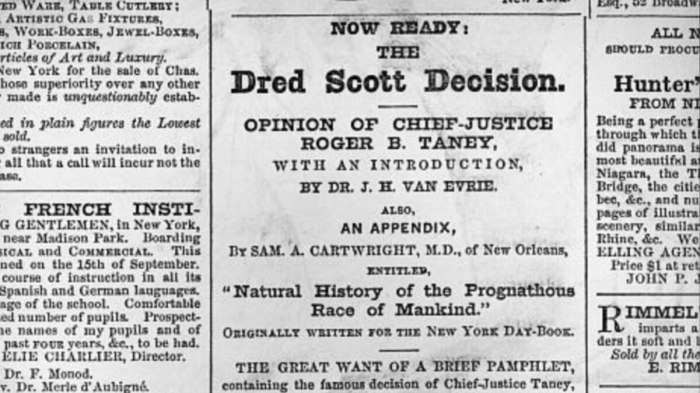Dred scott v sandford 1857 icivics answer key – The Dred Scott v. Sandford 1857 case stands as a pivotal moment in American history, shaping the legal landscape of slavery and the nation’s subsequent path toward civil war. This comprehensive guide delves into the intricacies of the case, exploring its legal arguments, historical context, and enduring implications.
The case centered around Dred Scott, an enslaved African American who sued for his freedom after residing in free territories. The Supreme Court’s ruling, which denied Scott’s citizenship and upheld the legality of slavery in certain territories, ignited a firestorm of controversy and deepened the sectional divide in the country.
Dred Scott Case Overview: Dred Scott V Sandford 1857 Icivics Answer Key

The Dred Scott case was a landmark decision of the United States Supreme Court that ruled that African Americans, whether free or enslaved, were not citizens of the United States and could not sue in federal court.
The case arose from a lawsuit filed by Dred Scott, an enslaved man who had been taken by his owner to free territory in the North. Scott argued that he had become free because he had been taken to free territory.
The Supreme Court ruled against Scott, holding that he was not a citizen and therefore could not sue in federal court. The Court also ruled that the Missouri Compromise, which had prohibited slavery in the territories north of the 36°30′ parallel, was unconstitutional.
The Dred Scott decision was a major blow to the abolitionist movement and helped to precipitate the Civil War.
Arguments and Legal Reasoning
The arguments presented by both sides in the Dred Scott case were complex and far-reaching. The plaintiffs argued that Scott was a free man because he had been taken to free territory. The defendants argued that Scott was not a citizen and therefore could not sue in federal court.
They also argued that the Missouri Compromise was unconstitutional.
The Supreme Court ruled in favor of the defendants, holding that Scott was not a citizen and therefore could not sue in federal court. The Court also ruled that the Missouri Compromise was unconstitutional.
The Court’s decision was based on a number of legal doctrines, including the doctrine of stare decisis, which holds that courts should follow the precedents set by earlier decisions. The Court also relied on the doctrine of comity, which holds that courts should respect the laws of other jurisdictions.
Historical Context and Impact, Dred scott v sandford 1857 icivics answer key
The Dred Scott decision was issued in the midst of a heated debate over the issue of slavery in the United States. The decision was a major victory for the pro-slavery forces and helped to precipitate the Civil War.
The decision also had a long-term impact on American society. It helped to create a legal framework that supported the institution of slavery and made it more difficult for African Americans to achieve equality.
Modern Implications and Interpretations
The Dred Scott decision continues to be relevant in contemporary legal and political debates. The decision has been cited as precedent in cases involving issues of race and equality. It has also been used to support arguments for a more restrictive interpretation of the Constitution.
There are a number of different interpretations of the Dred Scott decision. Some scholars argue that the decision was a correct interpretation of the Constitution. Others argue that the decision was based on racist ideology and that it should be overturned.
Detailed FAQs
What was the legal basis of the Dred Scott case?
The case rested on the question of whether Dred Scott, an enslaved African American, was a citizen and therefore entitled to sue in federal court. The Supreme Court ruled that he was not a citizen and thus lacked standing to bring the suit.
How did the Supreme Court’s decision impact the issue of slavery?
The Court’s ruling upheld the legality of slavery in certain territories, effectively nullifying the Missouri Compromise and further escalating tensions between the North and South.
What were the long-term consequences of the Dred Scott decision?
The decision deepened the sectional divide and contributed to the outbreak of the Civil War. It also cast a shadow over the Supreme Court’s legitimacy and raised questions about the limits of judicial power.